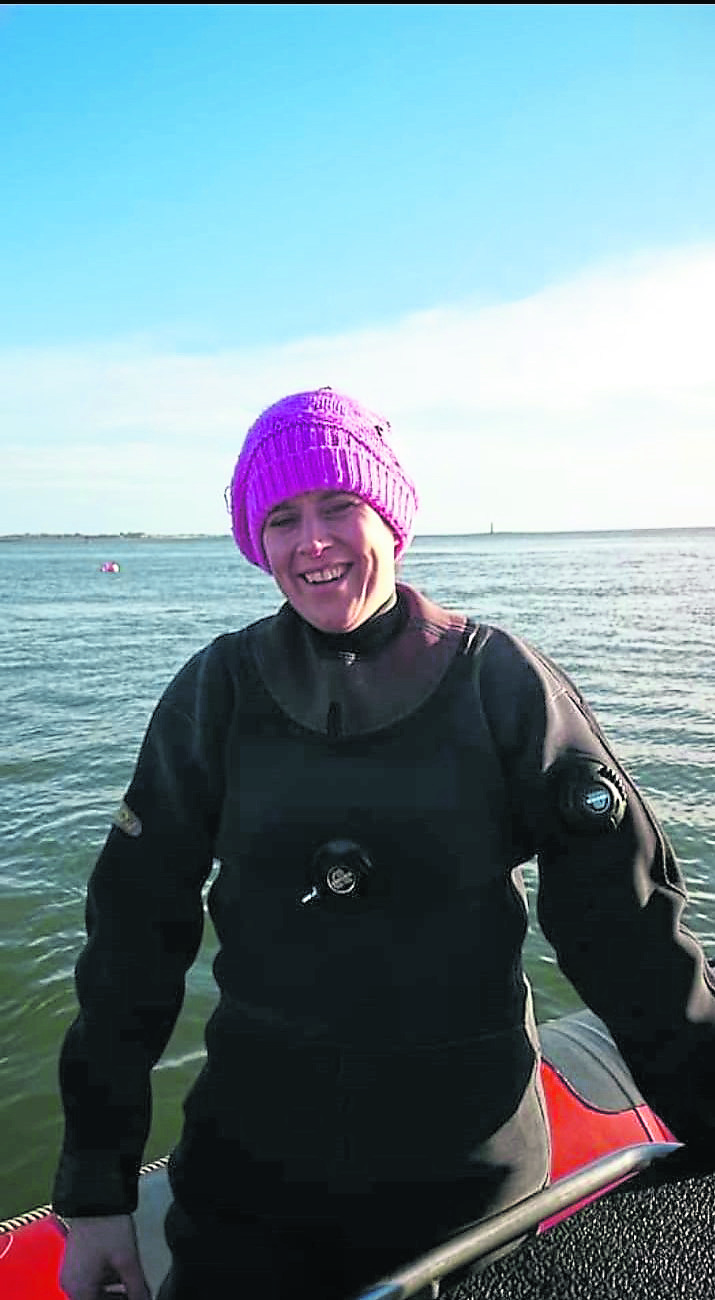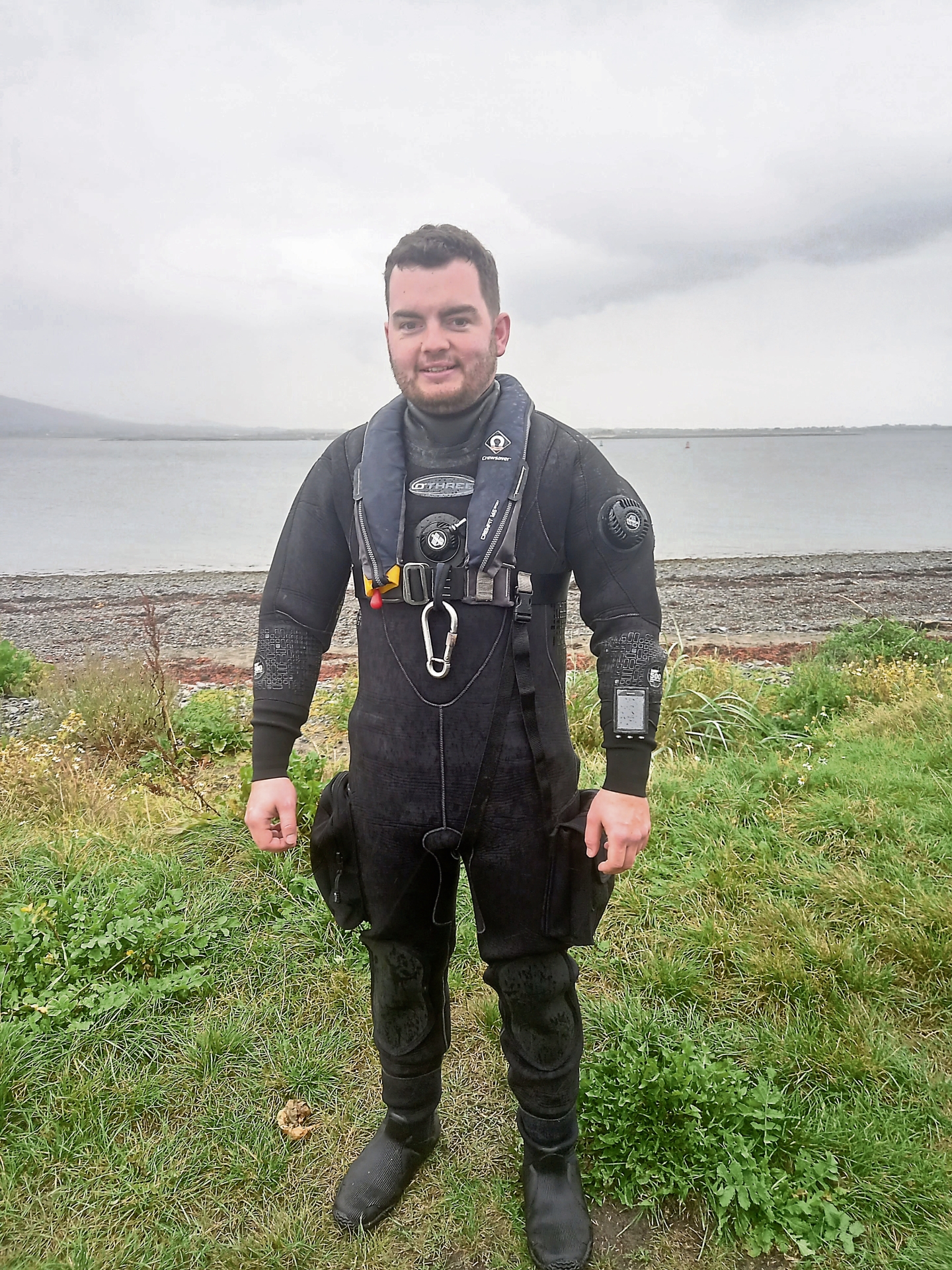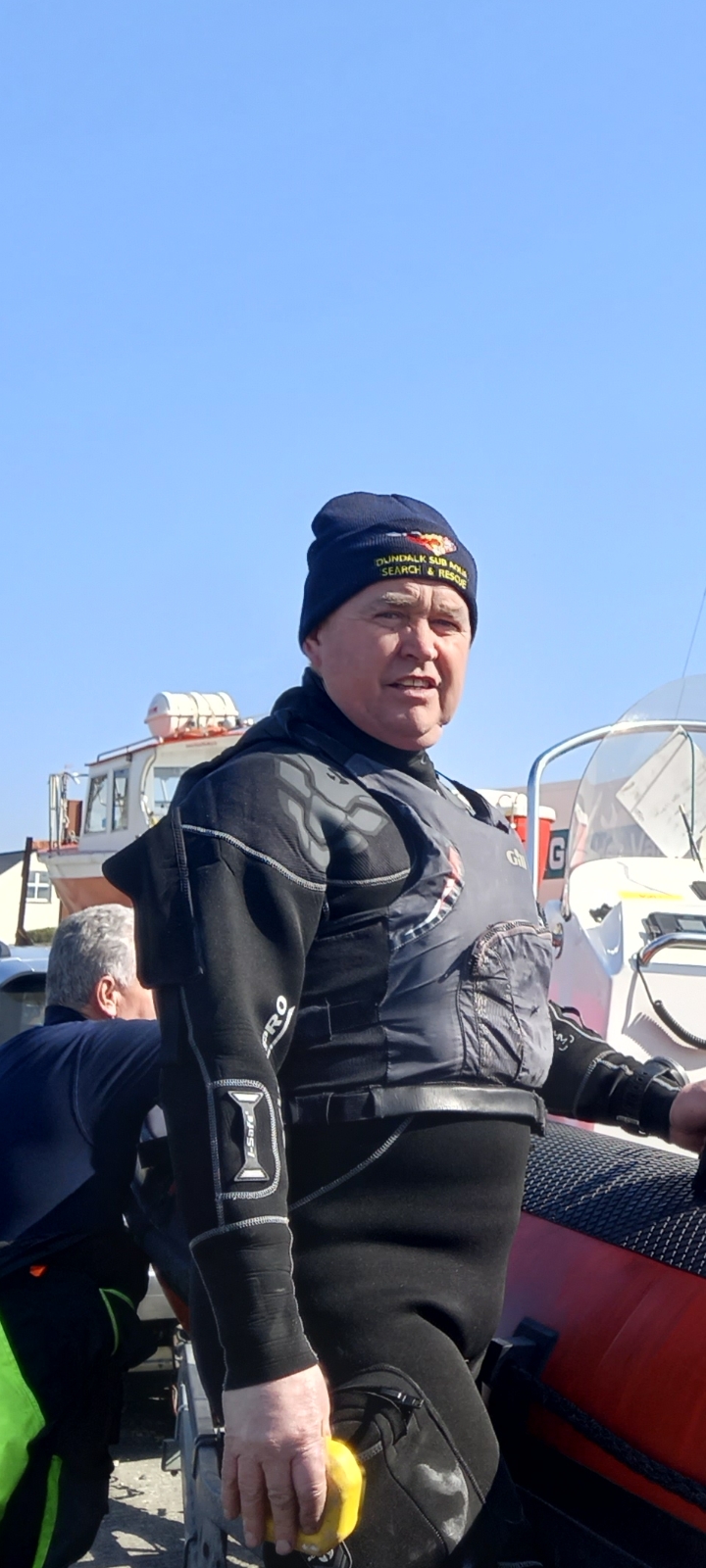
Dundalk Sub Aqua Search and Rescue Club members
Dundalk Sub-Aqua Club was set up in 2001 by a number of experienced local divers who joined together to pool their knowledge of local/national dive sites and diving experience achieved in other clubs north and south of the border, but who felt it was time to bring it home and set up their very own dive club.
Now one of the largest sub aqua clubs in the country, they have gone from strength to strength, taking on new people every year for training as well as having its own dedicated Search and Recovery Unit.
The Democrat chatted to three current members of the search and recovery unit to talk about their experiences of diving and the work done by the club.
Jacqueline Healy (Joined in 2003)

Jacqueline first got interested in diving while on holiday and decided to take it up when she came home.
“I knew there was a club in Dundalk and decided it was something I really wanted to get into,” she said.
After being placed on a waiting list to join the club, Jacqueline eventually joined, completing a twelve week course of training.
“It was an in-depth course held in both the classroom and pool, with the pool training done in Aura.
“I found it really enjoyable. It boosted my fitness levels, and I made some great friends that year as well.”
A desire to give something back to the community led her to join the Search and Recovery Unit in the Club in 2004.
“It’s a decision you don’t take lightly. But I wanted to give something back to the community and I would feel that if I was in a situation where I needed help from somebody, I would hope that somebody would help me or my family.
“Within the dive club you don’t have to do the search and recovery. If you don’t feel in any way comfortable that’s fine. I’ve been on plenty of searches where there are other jobs other than diving.
“Searches are really intense and it’s intense on both sides. Obviously, the family are grasping at straws and looking for a result and if you don’t have a result, it’s hard.
“It’s hard seeing the despair on their faces when you’re not giving them hope. It’s a hard situation to be in.”
The callout times for the Search and Recovery Unit vary. The club could get a few requests for help in the space of a month or go months on end without a callout, but members remain on standby, ready to give up their time.
“You could have a search every two weeks or you might not get anything for three months or more,” Jacqueline explains.
“The longest search I’ve been on was nine weeks. We were searching in Enniskillen… and I work full time so you drive up Friday or Saturday evening and you help out in the search and it was cold and visibility wasn’t great. Like I said, it’s a thing you can’t plan for.”
According to Jacqueline, one of the greatest assets divers need while on a dive, recreational or search and rescue, is trust in each other.
“You have to be aware of everything, you have to be aware of the family members, you have to be aware of the public, you have to be aware of people’s feelings.
“If we’re there to do a job, we have to be confident going into the water that you are not putting others in danger if you’re not feeling right or well.
“You trust your dive buddies and trust in yourself that you’re all aware of the situation and not laughing or joking when family members are going through a very stressful time.”
This trust in each other comes from the family atmosphere which Jacqueline says is fostered at the club.
“I love the dive club. It’s not just a dive club to me, they’re like my family.
“When I was going through turmoil the dive club rallied around me [and asked] what can we do for you?
It’s not all about diving and search and rescue, the [recreational] diving is amazing. It’s my favourite place in the whole wide world. It’s like a different world, and the sea life is fantastic. All the problems above the sea are just forgotten when you’re down there.”
Jacqueline is quick to stress that while the club provides a service to the community, the community is always happy to reciprocate.
“The community has been very good in Dundalk towards us with our annual bucket collection. We do all of this voluntarily and we buy our own gear. If any of our equipment gets damaged or destroyed we pay for it out of our own pocket. We get no government funding; it all comes through good will.”
Aaron Rooney (Joined 2012)

Like Jacqueline, outgoing Chairman of the club Aaron Rooney also got a taste for diving while on holiday and decided to pursue his interest when he got back.
“It was something I’d always seen on holidays and was something I always wanted to do, but didn’t have the qualifications to do it, so when I got home I did some research and realised it was something you could do here at home and not just on holidays.
“The Search and Recovery Unit seemed like something to naturally progress into because you have a lot of skills from diving that a lot of people don’t have and you can search and access places that the general public couldn’t go into.”
Divers can qualify for search and rescue after a two-day course once they have achieved their two star course, but Aaron says there’s no substitute for learning on the ground.
“We have to do two mandatory training days a year and then we have our own in house training, and at the end of the day every dive is a training dive even if it’s only for leisure.
“You’re still using your diving skills and learning and picking up things for when you do get called out on a search.”
Aaron says the recovery aspect to the club’s activities is something that’s not taken lightly and the club has definite processes in place when called into action.
“We’d generally get a call out from either the guards or the coast guards, who would contact our regional coordinator Ger.
“It then goes to our diving officer Finbarr who assesses if it’s feasible conditions wise and if we have the capability numbers wise to be in a position to assist.
“It’s unfortunate, but by the time divers get mobilised, especially in our sort of setup…, it’s generally a recovery, so it unfortunately turns out [that we] don’t have to be in a panic, so we’d be a bit more methodical about getting ready.
“We could get a search were somebody could be missing on the Tuesday or the Wednesday and then there could be a day or two of hasty searching by the emergency services and then it’s after all other options have been exhausted [we come in].”
Aaron has been the chairman of the club for the past two years with his term coming to an end last week and during this time he was one of the youngest in the country.
“It’s generally a position where people start diving in their late teens early twenties and they will spend their first few years enjoying their diving before they take up committee positions.
“I started diving when I was sixteen and had a few years under my belt before I started to take up committee positions.”
Aaron says the life experiences and atmosphere of the club have been invaluable, and is clearly proud of what they have built.
“We have a big club with great facilities and great boats, the craic you have even out of the water is just class, you have people with similar interests from all different backgrounds and they all come together in places you’d never expect to go to otherwise.
“When else would you expect to go to a deserted wee island off the coast of Ireland for a long weekend and have the best craic with 20 or 25 people?”
Finbarr Dillon (22 years founding member)

Finbarr is the club’s long-standing diving officer and was one of the founding members of the club.
“I started in the Newry club with a few mates and then a few of us decided to start our own club in Dundalk,” he explains.
Five years after getting trained up, the decision was made to start a Search and Recovery Unit as part of the club.
As a diving officer Finbarr arranges all the dives and checks out the safety of locations, surveying depths, winds, tides, and the entrance and exit to a site.
“By God, when you put that tank on your back, everything needs to be above board, so safety is very important and I have to say our club has been very safe.
“It’s the full responsibility of the diving officer to put them in somewhere and log them in and log them out.”
Alongside regional coordinator Ger Butterly, Finbarr plans and assesses the suitability of search and recovery dives.
“We put our heads together and look at the location and we would then put a text out for voluntary divers to give us a hand. I would then assess the area.
“You need to know your limits and your depths and make sure all your equipment is in order, safety is the most important thing before you enter the water and [knowing] the location of the area that you’re going and that there’s no danger areas.
“Every dive is different on search because sometimes you go into locations that you’re not aware of. We were on a dive in Enniskillen and there was a car at the bottom of the water in the pitch black, you’re hitting it and you’re hitting trunks of old trees undergrowth, roots, these are all things that you can’t see and have to research as you go along.”
For Finbarr, the best parts of the club are two fold:
“On the sports end of it, I just love diving and I love the hobby.
“On the search and recovery end of it, the best part is the success of recovering somebody’s loved one and taking them back. That’s closure for the family.”
For more info on joining visit: http://www.dundalksubaqua.ie/interested-joining
Subscribe or register today to discover more from DonegalLive.ie
Buy the e-paper of the Donegal Democrat, Donegal People's Press, Donegal Post and Inish Times here for instant access to Donegal's premier news titles.
Keep up with the latest news from Donegal with our daily newsletter featuring the most important stories of the day delivered to your inbox every evening at 5pm.